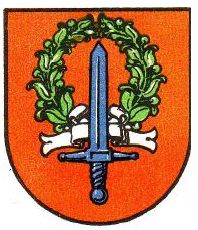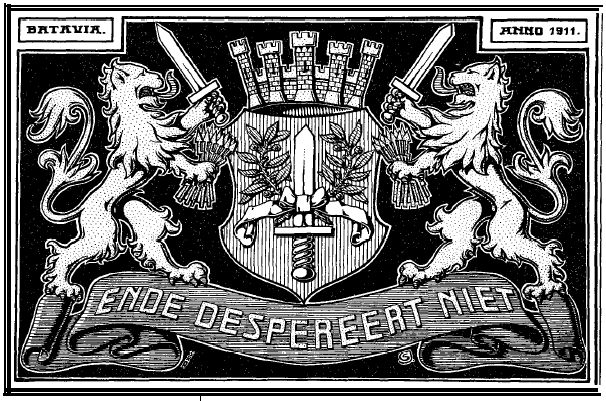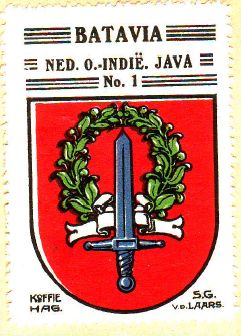Jakarta
| Heraldry of the World Civic heraldry of Indonesia |
JAKARTA (Daerah Khusus Ibukota Jakarta)
Origin/meaning :
The arms show the monument of liberty, on the Merdekkasquare in the city of Jakarta.
Colonial arms
The colonial arms are the oldest heraldic arms ever granted in Asia. On August 15, 1620 Jan Pietersz. Coen, Governor General of the Dutch East India Company (VOC), decreed the use of a seal for the new city of Batavia on which the arms of the city were to be placed. The arms were described as an orange shield with a blue sword surrounded by a brown laurel wreath.
| The arms from 1620 |
The orange shield, most likely a reference to the House of Orange (then stadholders, later Kings of the Netherlands) is rather unique, and therefore often shown in the more common red. In 1911 the city council adopted the arms with the red shield, the Dutch national lion as supporters, crown and motto "Ende Dispereert Niet".
The motto was derived from the arms of the Coen family; Ende Dispereert Niet (And don't dispare), see image below. There was a lot of discussion on these arms, especially the supporters, which did not actually support the shield as they held a sword and arrows.... Similarly the sword was described as from steel (not an official colour) and the colour of the laurel wreath was not mentioned.
| The arms from 1911 |
On Januari 14, 1929 the colour of the shield was changed again into orange. As the description of the rest of the arms was still not clear, the council adopted the arms again, but now properly described, on September 22, 1930.
The supporters were now normal lions, the crown was changed into a normal city crown and the motto shortened to Dispereert niet (Don't dispare). The colour of the ribbon with the motto was described as red, instead of the previously used blue. The council, however, continued the use of the blue ribbon, which was accepted by the government and the Dutch Court of Arms. But the official description was never changed !
| The full colonial arms from 1929/1930 |
The arms in the Koffie Hag albums +/- 1930 |
Literature : Rühl, 1933; Koffie Hag albums, 1920s and http://tlvima.leidenuniv.nl; information provided by j.h.j.m. holtzer (j.holtzer@hccnet.nl)





